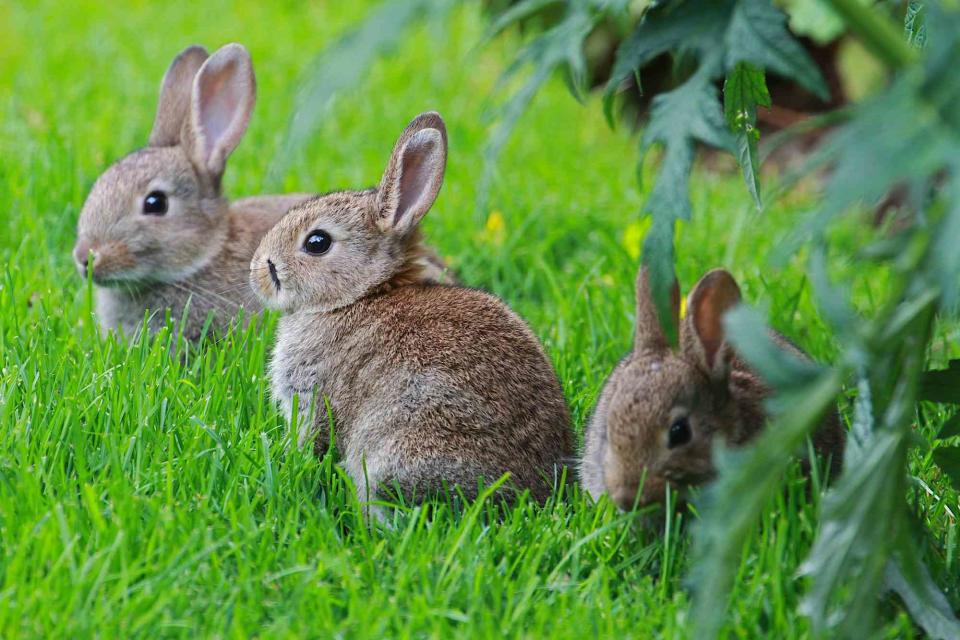Bunny-Proof Garden Tips And Plants To Outsmart Pesky Rabbits
Sorry, Peter Rabbit, but homeowners need to protect their gardens. Even Mr. McGregor would approve of these bunny-proof plants and techniques.

The idea of fluffy little cottontails frolicking around in the yard sounds appealing, until it's not. According to the Missouri Department of Conservation, landscaped yards are the ideal habitat for rabbits, which is why they're so prevalent in urban and suburban areas. This can lead to issues with homeowners (looking at you, Mr. McGregor), run-ins with pets, and more. So how do you know when your cute little rabbits have become a problem? And how do you get it under control once it is? For these questions and more, we tapped Angelo Randaci, Earth's Ally Horticulturist who shared everything he knows about keeping these cute and fluffy critters at bay.
Meet The Expert
Angelo Randaci is a horticulture expert for Earth’s Ally.
Are Rabbits Really That Bad for Your Yard?
"Rabbits can cause quite a bit of damage," says Randaci. Luckily for those who are willing to put in the research, Randaci assures that the amount of damage is dependent on which plants you decide to grow in your yard. Veggie gardens, specifically those with leafy greens, carrots (no surprise), beets, and beans are particularly appealing to cottontails, but they also enjoy snacking on flowers like petunias, pansies, and marigolds. That being said, it's not all bad news where rabbits are concerned. "While rabbits can be destructive with their eating habits, they also eat undesirable plants such as clover and other weeds in your lawn and garden," says Randaci. Not to mention there's the spectator quality: "For those who like watching wildlife in their own backyards, rabbits, like butterflies and birds, provide interest and movement that makes the landscape come alive."
Which Southern Locations Are Most Prone to Rabbit-Related Issues?
There's a certain type of rabbit that can wreak havoc on yards no matter the geographic location. All they need is a good food source, shrubs to hide under, and ideally a lack of pets. We're talking about the eastern cottontail, and its damage can be found throughout the South-central and Eastern United States. "Damage is widespread because of their broad plant-based diet through all seasons," says Randaci. "They will consume flowers, fruits, vegetables, and chew on woody plants, removing bark from trees and saplings."
Homemade Rabbit Repellents
So, what can you do if you find a family of eastern cottontails have taken up residence in your yard? First, you have to assess your climate for the proper technique. "Rabbit repellent products, whether homemade or purchased, will not work as well in moist environments or areas with heavy rainfall," says Randaci. Instead, he suggests opting for organic granular products that have more staying power and will prove to be more effective. You can certainly opt for store-bought options that come in both chemical and organic formulas, but if you're looking for a more natural route, consider a DIY deterrent. "There are several homemade concoctions that will help deter rabbits," he says. "Homemade ingredients include garlic, cayenne pepper, and coffee grounds." You'll need to reapply repellents on new growth as it emerges, as well as after watering or rain in order to keep it protected.
Rabbit-Deterring Tactics
If rabbits are persistent in your yard and consistently eat your plants, try some tactics that make it harder for them to get to the plants they love. Garden in tall pots on a porch or deck, or use raised beds. Grow plants rabbits love, like lettuce, in window boxes, hanging baskets, or somewhere out of reach. Fencing that’s about 18 inches tall with small one-inch openings, such as chicken wire, can be placed around individual plants, beds, and also be secured to the bottom of a taller fence with larger openings.
The Best Rabbit-Resistant Plants
The first thing to know about rabbit-resistant plants is that basically nothing is off-limits for our favorite little cottontails. "Rabbits may chew on a wide variety of plants, even plants that are on the rabbit-resistant list," says Randaci. "This is especially true of young rabbits that will sample plants to determine what they like and don't like."
Beyond taste, there are a number of plants that are poisonous to rabbits. Randaci says this includes plants in the onion family, rhubarb, jasmine, foxgloves, sweet peas, snapdragons, azalea, chrysanthemums, poppies, and lilies as well as the bulk of plants that start as bulbs like snowdrops, daffodils, crocuses, and hyacinths.
According to Randaci, fragrance can also create an invisible shield protecting plants from rabbits. "Many herbs, while not poisonous are not preferred because of their strong scent and or taste," he says. "These include chives, rosemary, leeks, mint, oregano, garlic, anise hyssop, thyme, sage, salvia, oregano, and catnip." If you aren't averse to its pungent fragrance yourself, opt for sweet alyssum if your location allows.
Try these flowers and shrubs in your garden:
Flowers and Flowering Plants
Allium (Allium)
Bleeding heart (Dicentra eximia)
Candytuft (Iberis sempervirens)
Foxglove (Digitalis purpurea)
'Rozanne' Geranium (Geranium ‘Rozanne’)
Hellebore or Lenten rose (Helleborus)
Lamb’s ear (Stachys byzantina)
Lavender (Lavandula)
Wax Begonia (Begonia x semperflorens-cultorum)
Yarrow (Achillea aleppica subsp. zederbaueri)
Shrubs
Holly (Ilex opaca)
Juniper (Juniperus scopulorum ‘Pathfinder’)
You don't have to convert to a garden full of plants rabbits dislike. Protect the plants you love, and add in some plants with a bitter taste, pungent smell, or rough texture like fuzzy or prickly leaves that may be less appetizing.
For more Southern Living news, make sure to sign up for our newsletter!
Read the original article on Southern Living.

